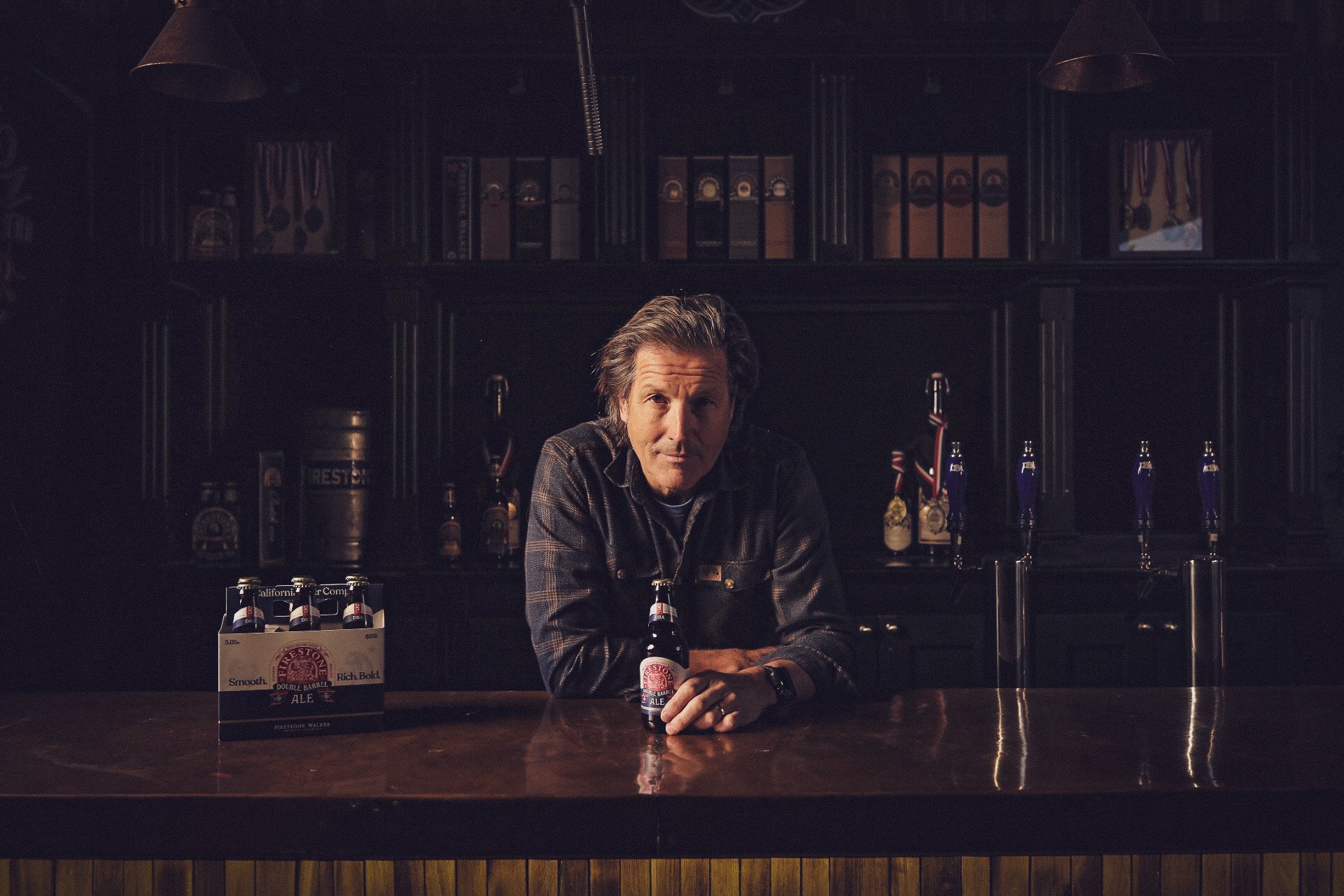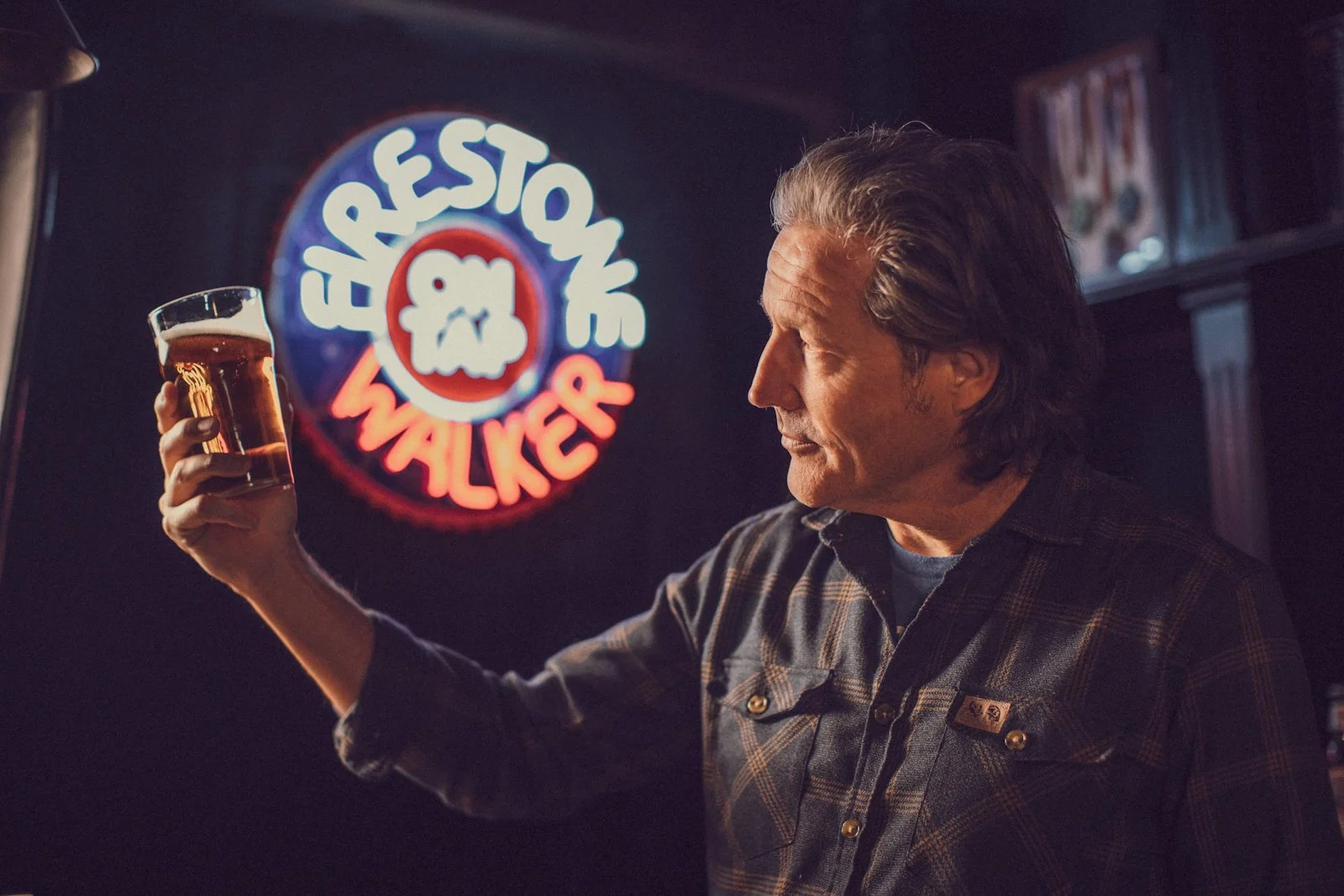Firestone Walker founder on the beer that inspired it all
Firestone Walker Brewing founder David Walker with DBA (Double Barrel Ale)
Everyone has that one beer – the beer that ignited your love for craft beer and sent you on a journey. This could be a basic lager or something more complex like a gueuze or lambic. In many cases, it’s a flagship from one of the pioneers of the craft beer industry. In our hyper-local craft scene where breweries often crank out several new releases every week, sometimes we overlook the classics and the staples that may have been super exciting at one point in time. These beers may feel antiquated or old man-ish compared to the latest pastry stouts or quadruple dry-hopped haze bomb, but they are still just as worthy of attention. They are also quite often the go-to beers for brewers who want a beer that is balanced, respectable, and not too much of a palate overload. In our column The Beers That Made Us, we talk with brewers about the beers that have made the biggest impact on them in terms of their personal taste and love of craft beer as well as well as how it inspired their approach to brewing.
This year marks the 25th anniversary of Firestone Walker, the little brewery founded by Adam Firestone (a.k.a. The Bear) and David Walker (a.k.a. The Lion) in Paso Robles, California. Along with a handful of other California breweries like Sierra Nevada, Anderson Valley, Russian River and Bear Republic, Firestone helped lead the way to our modern era of craft beer by carefully introducing drinkers to more hop-forward yet balanced offerings. These days, the brewery balances their lineup with widely available lagers, experimental IPAs, and a prestigious barrel program that puts out exciting stouts and sours. But all of this wouldn’t be possible without the English pale ale that put them on the map and helped beer drinkers in California and beyond think beyond the confines of mass-produced lagers. David Walker is still devoted to this beer twenty-five years later, and for this special edition of The Beers That Made Us, we decided to mix things up by talking to him about the beer that started it all for Firestone Walker and made the brewery what it is today. While we normally ask brewers about another beer that was influential and is worthy of attention, we thought it would be fun to let Walker reflect on one of his own.
Beer:
Firestone Walker Double Barrel Ale (DBA)
Your first time:
David Walker (DW): We ran our first test batches at UC Davis, before our brewhouse was functional. Our dream of re-creating the English Pale Ale in its traditional form and integrating primary fermentation through “Burton Union”-like conditions was tested there first. We used a five-gallon oak barrel and the beer was 100% fermented in oak. It lacked balance. It was soaked in tannins from the fresh American oak and functionally undrinkable. That said, there were hints of its future as the London Ale yeast broke through in an unusually fruity manner, indicating the Union was doing its work.
Many months later, we perfected the beer on our larger brewhouse (24bl) with larger 60-gallon American oak barrels, and we went to work finding a sweet spot by blending DBA fermented in steel and DBA fermented in the Union. We found it.
What beers inspired this beer:
DW: Being born out of a third-generation estate winery, our reflex was always to respect tradition. DBA was inspired by the true English Pale Ales and the one that seemed closest to the source was Marston’s Pedigree: a beer brewed in Burton-upon-Trent and fermented in traditional Burton Unions. This was the inspiration. Where we ended up was different but close enough. I daresay better.
What makes it special:
DW: It was our first born and embodied all the hopes and dreams we had in launching the brewery. That’s a heavy mantle to shake. But it also slips down like no other beer we make. Sometimes you just want to be nourished by a beer.
Why this beer is influential:
DW: I suppose it confirmed that craft brewers were indeed different and serious about being artisans. It made no financial or microbiological sense to ferment a beer in oak. But those were the sort of things small-batch craft brewers were doing and people began to spread the word. The brewing community suddenly had more to talk about than “refreshment, good times and marketing gimmicks.”
Why beer drinkers should pay attention:
DW: It’s an honest beer, with some insane provenance for our brewery. It set the tone for twenty-five years of innovation and discipline for making beautiful beer. For those reasons alone, it’s worth a gander. DBA is so elegantly balanced that it charms a smile from anyone who drinks it. It kills me that it’s slowly retreating to a specialty beer. That said, once I can put my emotions in check, I understand the reasons.
DBA was a pioneer in helping break open consumers romance with American Craft Beer. That evolution has been rapacious; consumers have sought out and demanded more breweries, more beer styles, more branding, more of everything; a firestorm of passion for beer. To think DBA could survive that force is unrealistic. But it gave birth to a brewery and holds a place in our history for that reason.
How this beer inspired your brewery:
DW: One could argue our whole specialty barrel program was a natural evolution of this work. We simply had no issue with wood in our cellars...as long as our [quality control] teams were capable of policing it. Our wild ale program is all barrel fermented and we have produced more than one hundred beers, mainly in small batches. In terms of the controlled fermentation conditions that we seek for DBA, it’s on its own. A true nod to one of the great beer styles of the world.
Follow The Beers That Made Us series for more interviews with the founders of Russian River Brewing, Cloudburst Brewing, De Garde, Chuckanut, and others on the beers that inspired them.




